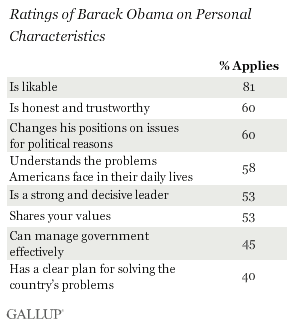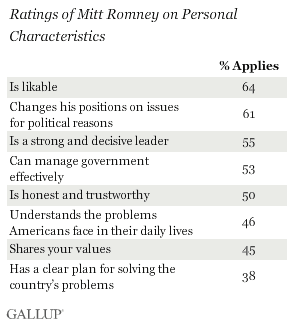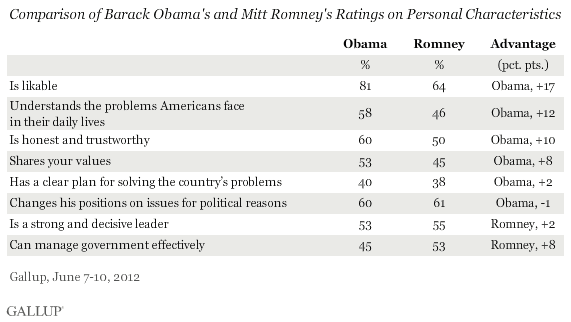PRINCETON, NJ -- Although Barack Obama has a clear advantage over Mitt Romney in terms of perceived likability, it is the characteristic Americans most associate with both candidates among eight tested in a recent Gallup poll.


Gallup previously reported a big advantage for Obama when Americans were asked to choose whether Obama or Romney was more likable. The June 7-10 poll -- which asked Americans to rate Obama and Romney separately on each characteristic -- supports that conclusion, but finds that most Americans still perceive Romney as likable.
Overall, half of Americans believe both candidates are likable, with 28% ascribing this trait only to Obama and 12% only to Romney. Just 4% consider neither candidate likable.
Romney has been criticized by his opponents in recent years as being too quick to change his issues positions, particularly from more moderate positions while campaigning for the U.S. Senate and for governor in Massachusetts to more conservative positions while campaigning for president nationally. And 61% of Americans believe he changes his positions on issues for political reasons, nearly as many as perceive him to be likable. However, nearly the same percentage, 60%, say Obama changes his positions for political reasons, also among the most common perceptions about the president.
Beyond likability and changing issue positions, Americans are most likely to see Obama as being honest and trustworthy (60%) and being able to understand the problems Americans face in their daily lives (58%).
Meanwhile, 55% say Romney is a strong and decisive leader and 53% say he can manage government effectively.
Both candidates get their lowest scores for having a clear plan for solving the country's problems -- 40% say Obama does and 38% say Romney does.
Managing Government a Relative Strength for Romney
A comparison of the two candidates' scores on each of the eight character dimensions finds Obama scoring better than Romney on four, the two getting essentially the same score on three others, and Romney having a higher score on one -- managing the government.
Specifically, Obama's advantages come in likability, understanding Americans' problems, being honest and trustworthy, and sharing people's values.

Thus, while Americans may rate Obama better on characteristics related to empathy, Romney seems better positioned in terms of perceived competence. The two are essentially even when it comes to leadership qualities.
Implications
Americans have definite opinions about the personal and presidential qualities of Obama and Romney, but there still may be some opportunity for the candidates to change those perceptions during the remaining months of the campaign.
The campaigns will also attempt to leverage the candidates' current strengths, and reinforce these in voters' minds. Obama clearly has the advantage in terms of likability and empathy. Since neither candidate currently has an advantage in leadership, Romney's best argument for convincing voters to support him may be his ability to manage government.
Being able to manage government could be a particularly persuasive argument in an election year likely to be decided on economic issues. The downside for Romney is currently that is his only clear advantage over Obama in terms of personal qualities, so he would have little else to fall back on in that area.
And while the large likability deficit is a concern for Romney's campaign, the fact is most Americans still see him as likable, which may make his trailing on this dimension less of a hindrance to getting elected.
Survey Methods
Results for this Gallup poll are based on telephone interviews conducted June 7-10, 2012, with a random sample of 1,004 adults, aged 18 and older, living in all 50 U.S. states and the District of Columbia.
For results based on the total sample of national adults, one can say with 95% confidence that the maximum margin of sampling error is ±4 percentage points.
Interviews are conducted with respondents on landline telephones and cellular phones, with interviews conducted in Spanish for respondents who are primarily Spanish-speaking. Each sample includes a minimum quota of 400 cell phone respondents and 600 landline respondents per 1,000 national adults, with additional minimum quotas among landline respondents by region. Landline telephone numbers are chosen at random among listed telephone numbers. Cell phone numbers are selected using random-digit-dial methods. Landline respondents are chosen at random within each household on the basis of which member had the most recent birthday.
Samples are weighted by gender, age, race, Hispanic ethnicity, education, region, adults in the household, and phone status (cell phone only/landline only/both, cell phone mostly, and having an unlisted landline number). Demographic weighting targets are based on the March 2011 Current Population Survey figures for the aged 18 and older non-institutionalized population living in U.S. telephone households. All reported margins of sampling error include the computed design effects for weighting and sample design.
In addition to sampling error, question wording and practical difficulties in conducting surveys can introduce error or bias into the findings of public opinion polls.
View methodology, full question results, and trend data.
For more details on Gallup's polling methodology, visit www.gallup.com.
